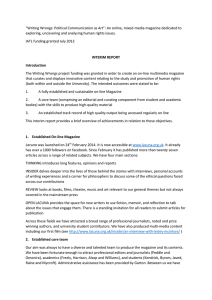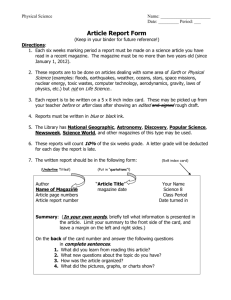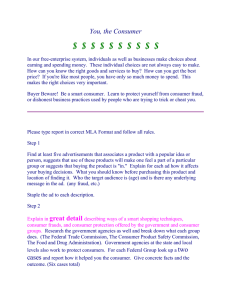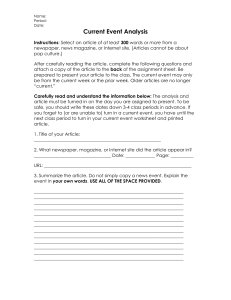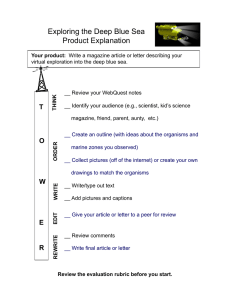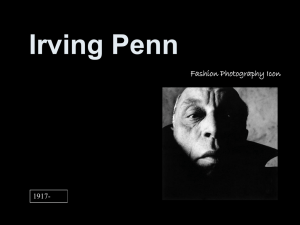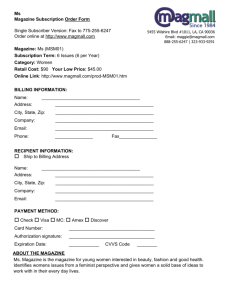“Writing Wrongs: Political Communication as Art”: An online, mixed-media magazine
advertisement
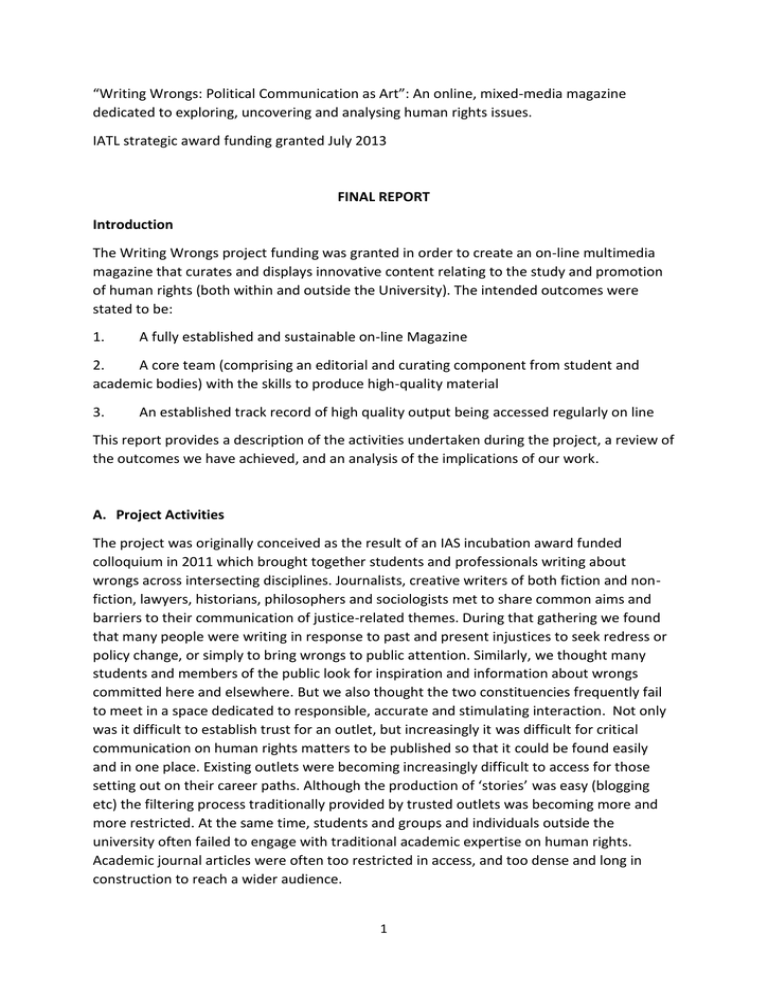
“Writing Wrongs: Political Communication as Art”: An online, mixed-media magazine dedicated to exploring, uncovering and analysing human rights issues. IATL strategic award funding granted July 2013 FINAL REPORT Introduction The Writing Wrongs project funding was granted in order to create an on-line multimedia magazine that curates and displays innovative content relating to the study and promotion of human rights (both within and outside the University). The intended outcomes were stated to be: 1. A fully established and sustainable on-line Magazine 2. A core team (comprising an editorial and curating component from student and academic bodies) with the skills to produce high-quality material 3. An established track record of high quality output being accessed regularly on line This report provides a description of the activities undertaken during the project, a review of the outcomes we have achieved, and an analysis of the implications of our work. A. Project Activities The project was originally conceived as the result of an IAS incubation award funded colloquium in 2011 which brought together students and professionals writing about wrongs across intersecting disciplines. Journalists, creative writers of both fiction and nonfiction, lawyers, historians, philosophers and sociologists met to share common aims and barriers to their communication of justice-related themes. During that gathering we found that many people were writing in response to past and present injustices to seek redress or policy change, or simply to bring wrongs to public attention. Similarly, we thought many students and members of the public look for inspiration and information about wrongs committed here and elsewhere. But we also thought the two constituencies frequently fail to meet in a space dedicated to responsible, accurate and stimulating interaction. Not only was it difficult to establish trust for an outlet, but increasingly it was difficult for critical communication on human rights matters to be published so that it could be found easily and in one place. Existing outlets were becoming increasingly difficult to access for those setting out on their career paths. Although the production of ‘stories’ was easy (blogging etc) the filtering process traditionally provided by trusted outlets was becoming more and more restricted. At the same time, students and groups and individuals outside the university often failed to engage with traditional academic expertise on human rights. Academic journal articles were often too restricted in access, and too dense and long in construction to reach a wider audience. 1 Having identified what we saw as a gap, a number of us in the Law and English departments believed that we should do something about it. Our idea was to construct an on-line multimedia magazine that curated and displayed innovative content relating to the study and promotion of human rights (produced from both within and outside the University) and provided a forum for encouraging and developing creative methods of sharing ideas and commentary and first-hand accounts of wrongs committed anywhere in the world. We decided eventually on the name Lacuna to signify that we were intending to fill a gap in the kind of literature and reportage that we thought was rarely available in the media. Once funding was obtained from IATL to undertake the project we assembled a team of people who could offer a range of expertise and skills from various constituencies. We recognised the need to reflect the different communities of students, professional writers, and academics to be involved in such a venture and who might be interested in reading the result. From the student community we attracted dedicated and committed involvement from Abby Kendrick, Natalie Byrom, Aaqib Javed, Natalie Raine, Alison Garton, Rebecca Munro and Jon Mycroft, although many others would help with both content and marketing. The main academics involved were Maureen Freely, James Harrison, Naomi Alsop and Andrew Williams, though again we managed to acquire occasional support from members of a number of departments, either in advertising the project, soliciting content or generally helping promote the magazine. Finally, we were fortunate enough to attract award winning professional editors and journalists Kay Peddle and Rebecca Omonira who provided essential project management relevant to the production of a literary style magazine. Having gathered the team together we recognised that there were three separate prepublication activities that we needed to focus upon: the technical design and build of the magazine on-line format; the shaping of the content; and the marketing of the magazine within and beyond the University. 1) Technical Matters Abby Kendrick (a PhD student) led the design and build of our magazine website. We quickly realised that the standard University programme would not allow us to develop a style that would reflect our project. We therefore chose to adopt a Wordpress programme off-site. This allowed us the freedom to use all those visual elements that would make the magazine accessible and attractive. It has proven to be an ideal model. The design also reflected the variety of content which we aimed to provide. This is covered in more detail below. However, the adopted programme gave us the flexibility to change the design later in the project’s life (though after this IATL funded element). 2) Content We wanted our initial design to reflect the interests of those whom we hoped would read the magazine. Four sections provided the core content: 2 THINKING introduced long features, opinions and reports that would provoke our audience. INSIDER delved deeper into the lives of those behind the stories with interviews, personal accounts of writing experiences and a corner for philosophers to discuss some of the ethical questions faced across our contributions. As part of this element we decided to launch Lacuna Films to develop our video content, mostly focused on recorded interviews. REVIEW looked at books, films, theatre, music and art relevant to our general themes but not always covered in the mainstream press. OPEN LACUNA provided the space for new writers to use fiction, memoir, and reflection to talk about the issues that engaged them. A standing invitation for all readers to submit articles for publication was issued and remains our policy. This section has been our flagship within the University as it has unearthed talented writers from the student body. Many UG and PG students have had their work published here. The quality has been exceptionally good. To attract contributions, we formed a student team with Alison Garton as its initial coordinator. We advertised amongst the student body across the university and appointed a number of UG and PG to help make contact with students and solicit material. With these elements providing our scope, we then set about attracting contributions for set themes. The first was to be Protest and we drew on all our collective contacts in order to have an impressive launch edition. This was achieved in February 2014, since when we have continued to publish material so that by the time of writing we have now over 115 articles available on-line within the Magazine’s archive. Many of these have been written by students and academics from Warwick but we have also attracted unsolicited contributions from leading authors and journalists. Jon Snow, the TV presenter, AL Kennedy and Nathan Filer award winning novelists, journalists and writers, have provided some excellent original content. 3) Promotion Clearly we didn’t want to publish a magazine that no one was able to access or no one heard about. This has proved to be our biggest challenge: how to make the world aware of the magazine. We have developed a number of strategies, from general e mail shots (both within the university and beyond) to events, from facebook pages (currently with 1670 followers) to twitter feeds, from newsletters to co-publishing partnerships with other publications (notably OpenDemocracy and the New Statesman). It remained a constant issue for us and required a considerable amount of training for our team. However, this paid off with access to our webpages averaging a 1000 unique hits a week 3 by the end of the funded period and rising on occasion to tens of thousands for particular items we’ve published. Since our launch in February 2014 we have continued to develop our student involvement in the project and ensure that the magazine remains very much a live one for all concerned. The IATL funding enabled us to establish the framework for the magazine and produce high quality outputs over the past 12 months or more. B. Outcomes Lacuna was launched on 24th February 2014. It is now accessible at www.lacuna.org.uk. It has over a 1600 followers on facebook. Since the launch it has published more than 115 articles across a range of related subjects, a number of films, original artwork, poetry, short stories and consistently well-received features. We have attracted a broad range of professional journalists, noted and prize winning authors, leading academics and university student contributors. We have also produced multi-media content (see http://www.lacuna.org.uk/insider/an-interview-with-lesleymcintyre/ ). We believe the content speaks for itself. We have a rich diet of articles, films and reviews in archive and aim to produce material every week. The value of our content was recognised at our launch event at the Frontline Club event which was organised by Lacuna (see http://www.frontlineclub.com/art-and-politics-the-aesthetics-of-protest-andthe-fight-for-human-rights/ ) We have given equal prominence to student contributors as to outside professionals and academics. Our aim has been to develop writing skills so that content can be produced that will enhance the writing of the students involved. We have a team of student coordinators who work with students when they are making proposals for submissions and when they have submitted a piece of work. In addition to the content driven aspects of the project we have developed the skills of student participants through a number of general workshops and accessed training seminars. In February/March 2014 we organised the delivery of student sessions on (a) review writing, (b) editing, and (c) feature composition. We also ran a bi-weekly reading group to evaluate the style of writing that we wished to follow and encourage. As a result of these efforts we have given many students the opportunity to have their work published alongside professional writers. We should also note that Lacuna’s value has been noted by the Orwell Prize committee who recently long-listed our team member, Rebecca Omonira, for its journalism prize for 2014. This is a major landmark for us as it puts us in the same bracket as the other papers in line for the award, which includes the London Review of Books, The Guardian, the Telegraph and other mainstream publications. 4 C. Analysis of the implications of our work The most significant implication for our project has been the development of writing as an art. Too often, the quality of writing by students and academics is derided as being inaccessible or unengaging. Our aim has been to address this and at the same time tap into the knowledge and innovative thinking and research that lies within the academic community. From a policy perspective, the project continues in the traditions of the Writing Programme and other initiatives that IATL have supported over the years. By providing an established and respected outlet for writing and other media representations of academic research in the particular area of human rights, we believe we have enhanced the public engagement agenda for the university. More importantly we have encouraged new writers to come forward and with our help develop their skills for future use. Contact for further discussion: Andrew Williams A.T.Williams@warwick.ac.uk 10 April 2015 5
